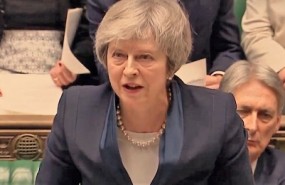Pound unmoved as May still 'chasing unicorns' with EU - analysts say
Many see request to extend Article 50 increasingly likely
Risk of no-deal Brexit is low but increasing
Sterling recovered its poise on Wednesday after stumbling overnight after parliament voted to deny itself the opportunity to delay Brexit, with analysts seeing the risks of a no-deal rising.
The pound initially fell after the House of Commons voted against the Cooper amendment, which was designed to allowed Parliament to delay Brexit, though MPs did vote in favour of the Spelman amendment against a no-deal Brexit.
For the government, the main development overnight was that it won a thin majority to seek an alternative to the Irish backstop, after Theresa May essentially capitulated to the hard-Brexit supporters in her party and abandoned part of the Brexit deal she negotiated for most of last year.
May said she will now head to back to Brussels to reopen negotiations with European leaders, even though EU President Donald Tusk has already insisted that there can be no renegotiation.
"Although there is a majority in parliament against a hard Brexit - as last night’s symbolic vote on such an outcome demonstrated - that alone is not enough to prevent such an outcome," observed Berenberg economist Kallum Pickering.
"A hard Brexit is the default option unless a deal or delay is secured before Brexit day on 29 March 2019. With only 58 days left until the UK is due to leave the EU, we raise the risk of a no-deal from 20% to 30%, and lower the probabilities of 'Norway plus - soft Brexit' and 'no Brexit'."
Indeed, government "is still chasing Brexit unicorns", said Lee Hardman, currency analyst at MUFG.
With time running out, Hardman believes a UK request to extend Article 50 appears "increasingly likely" despite Tuesday's votes. "Until there is clearer evidence that the UK is heading towards extending Article 50, the pound may find it more of a struggle now to advance further in the coming weeks. It leaves the pound more vulnerable to a reversal of recent gains as well."
Supporting the pound and certain sectors seen susceptible to a change in government, such as utilities, was the view, put forward by Citi strategists that the outcome of Tuesday's votes maximise May's bargaining power in Brussels, while the new-found "unity of the Conservative Party also materially reduces the risk of early elections and thus the likelihood of Jeremy Corbyn becoming PM soon".
While the failure of the Cooper amendment extends no-deal risk and perhaps even increased as no further Brexit vote is currently scheduled, Citi added: "The fact that the UK economy seems to be holding up while the EU economy is weakening may encourage the UK side to take negotiations to the wire."
Tuesdays votes, however, "are unlikely to constitute a viable negotiating strategy for the government", Citi said, agreeing that a request to extend Article 50 appears "highly likely".
"The unity of its parliamentary backers could splinter quickly if the EU rejects renegotiating the Northern Ireland backstop. Further economic consequences of the protracted uncertainty are still likely and may undermine unity. Parliament retains the power to withdraw confidence in the government and replace it or call new elections. An Article 50 TEU extension is still a highly likely scenario," Citi said.

